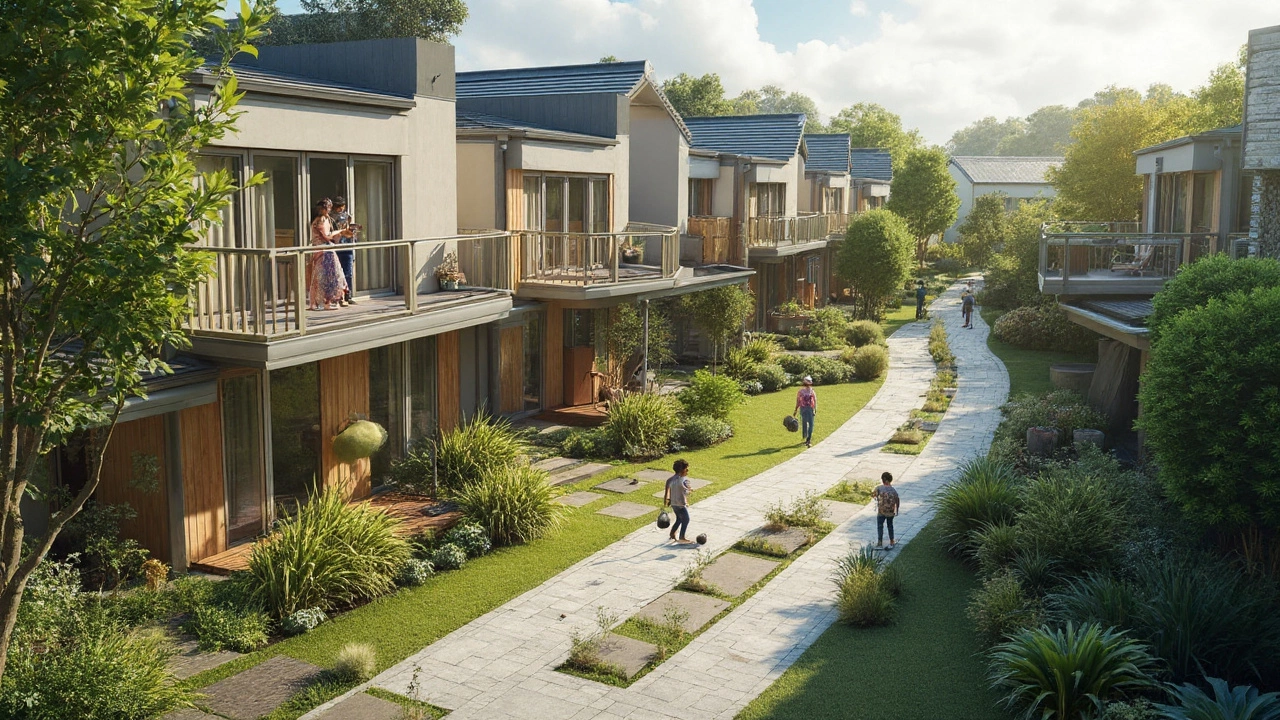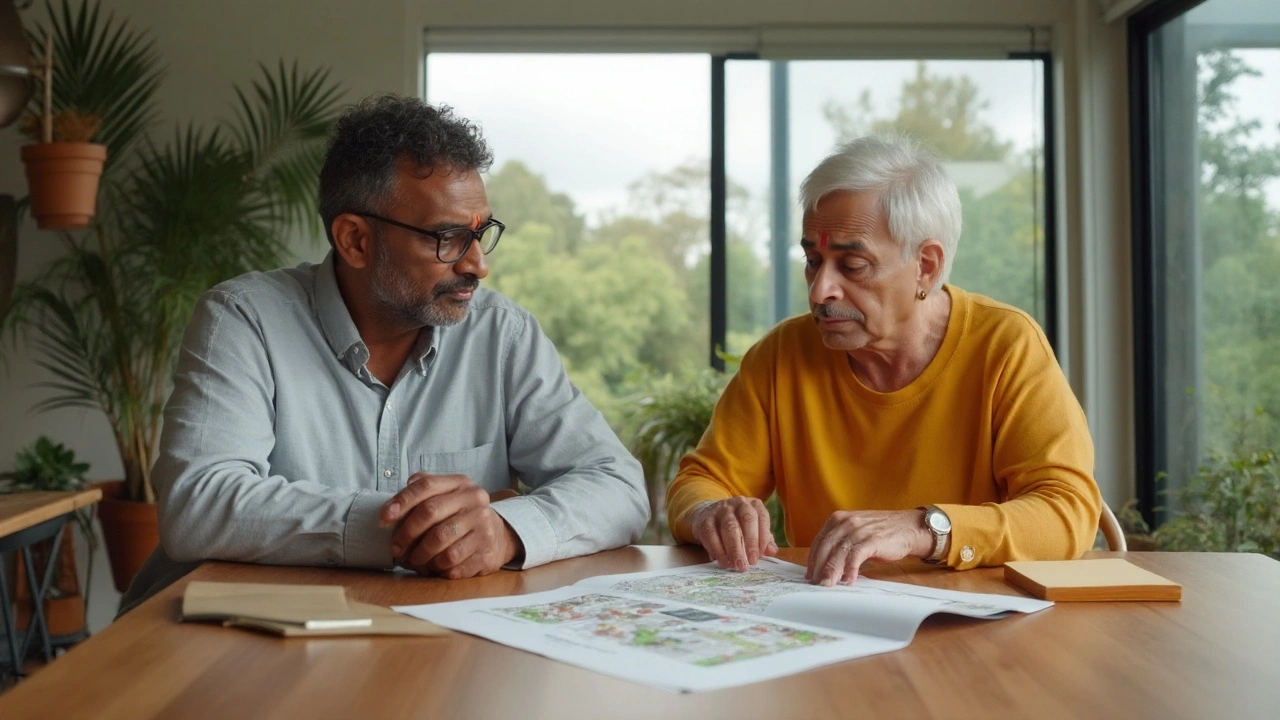Do You Really Own the Land Around Your Townhouse? Auckland's Property Rules Explained

Ever bought a townhouse and thought, “Sweet, I own everything from the edge of the footpath to the back fence?” Here’s where it gets tricky: not all homeowners in Auckland actually own the bit of land under or around their townhouse. Sounds odd, right? The difference between owning a freestanding house and living in a townhouse can be more confusing than you might expect—especially when it comes to the legalities pinned (often literally) to your bit of dirt. So before you dig up that shrub or build an epic deck, let’s clear up who really owns what, and why the rules on townhouse land can feel like decoding instructions for flat-pack furniture.
Decoding Townhouse Land Titles in Auckland
Land isn’t all the same under property law, and townhouses are the proof. In Auckland—and most of New Zealand—if you flick through property listings, you’ll notice words like ‘fee simple’, ‘cross-lease’, and ‘unit title’ appear a lot. Each phrase tells you a completely different story about who actually owns the earth outside your lounge window.
'Fee simple’ means freehold ownership. You own your townhouse and the chunk of land it sits on. You get the final say over the garden, driveway, and sometimes the air above it—just like you would with a detached house. Want to plant a lemon tree or paint the fence purple? Go for it, although your cheerful neighbour might have opinions.
But fee simple townhouses are rare, especially in newer developments where the need to squeeze more homes into smaller plots has seen the cross-lease and unit title models take off. With cross-lease, your actual legal ownership is a share in the whole piece of land, plus a ‘lease’ granting exclusive rights to use your flat. So, sure, the grass outside your window feels like yours, but any permanent change—think fences, decks, extensions—needs consent from other cross-lease owners. Sometimes even a border of daisies can become a subject for committee debate.
The third common approach, unit title (often called a ‘body corporate’), means owning your patch inside the walls and sharing ownership of the wider property—driveways, gardens, even the roof—with everyone else in the block. The body corporate manages repairs, gardening, insurance, and sets rules. Ever seen a sign warning ‘No washing on balconies’ or ‘No dogs allowed’? That’s the body corporate at work. The space just outside your living room door might not be yours in any real, legal sense—often, it’s “common property.” If you want to change even a light fitting in the porch, expect forms, votes, and possibly fees.
For buyers used to stand-alone houses, the surprise comes in these fine-print details. In 2024, Auckland Council reported that more than 60% of new homes consented in the city were terrace houses, units, or apartments. Townhouses are here to stay, and almost all in the central city operate as unit titles or cross-leases. A quick check of your property’s Record of Title (available from Land Information New Zealand for $15) is the fastest way to know exactly what you own—and what you share.
What Can You Actually Do With ‘Your’ Land?
This is where reality bites. In a fee simple townhouse, you can generally make most changes you want—within the restrictions of local council by-laws, heritage overlays, and a byzantine Auckland Unitary Plan. Changes like building a deck, new fencing, or extending your living room usually require council consent, but after that, it’s your call. You’ll deal only with the council; no neighbours get a veto just because your taste in pergolas is questionable.
Cross-lease and unit title owners, though, walk a tightrope. Cross-leasers have a legal agreement (the lease) that binds everyone on the property. Any material change—building a shed, changing lawns to flowerbeds, adding a heat pump—can require written approval from every other lessee. And if you just go ahead? You could face legal action, or be forced to reverse the change at your own cost. Arguments about car parks and chickens aren’t just folklore; a 2023 Auckland tribunal case saw a family forced to rip up a new deck because their neighbour wouldn’t agree to it. The courts tend to enforce the original lease terms, even if you think your tweak is harmless.
Unit title land is even stricter. The body corporate sets rules, and change happens through committee decisions. You want to build a veggie patch or add a barbecue? It might not be allowed at all, or might need a meeting (yes, really) and a vote. If you move into a place hoping to run a landscaping business from the backyard, I hope you like virtual plants. The flipside is benefits: body corporates handle joint insurance (crucial after Auckland’s record rainfall and flooding in early 2023), repairs, and even pest control, saving the hassle of solo negotiation.
It’s not all doom and gloom for would-be tinkerers. In some ‘exclusive use’ areas—an outdoor space marked only for your lot on the title—you can get more freedom. Sometimes balconies, courtyards, or car parks come under this label. But, always check both your title and the body corporate rules before you swing a hammer. Even potted plants have been debated (and rejected) by some stricter committees. The golden rule: read every line of the property record and cross-check it against the body corporate handbook. If you’re unsure, run it past a property lawyer—nobody wants a neighbourly feud blowing up faster than a leaky home report.

Navigating Auckland’s Stricter Development Rules
Auckland’s explosive growth means land’s not just scarcer, but more regulated. The Unitary Plan, which buried the city in paperwork starting in 2016, aims to encourage higher density—hence all those townhouses. It spells out the ‘do’s and don’ts’ for what you can build, plant, or change—even down to fencing materials or letterbox styles. Recently rezoned neighbourhoods like Mt Eden, Onehunga, Te Atatū, and Panmure are a testing ground for these changes. Local councils now have special rules to protect sunlight, reduce noise, and stop let’s-be-honest-hideous renovations.
If you’ve got a modern townhouse, chances are high you’ll come up against minimum boundary setbacks (how far your building must stand back from the edge), height restrictions, daylight controls, and even rules on what colour of paint is allowed for the fascia board. Auckland Council rolled out new compliance checks in 2024 after a string of complaints about unpermitted decks and fences popping up overnight in new suburbs. It’s not open slather: dig a trench or plonk down a hot tub without checking, and you’ll be tripping over council fines. Phone calls to 09 301 0101 (the council’s hotline) about property disputes rose by almost 15% last year.
Some of the trickiest problems? Shared driveways, stormwater pipes running across multiple lots, and crisscrossing utility easements. One neighbour’s burst pipe might mean digging up another’s roses. The council expects you to sort these disputes privately, but if talks break down, you can wind up in mediation or at the Tenancy Tribunal. There are even some wild stories where owners have just gone ahead—like the Remuera townhouse in 2023 where an owner put up a two-metre fence, only to be ordered to knock it down weeks later after neighbours objected.
There are a few clever ways to avoid drama. Before you buy, ask for a copy of the exact survey plan, not just the online summary. Look for red lines marked as ‘common property’ or ‘exclusive use’. If you’re planning a big project, check whether it impacts drainage, fire walls, or utilities. Most disputes start because someone just didn’t realise their deck poked over a shared line. If in doubt, asking the council’s compliance team can save hours and thousands of dollars in fixes.
Busting the Myths: Tips for Peaceful and Profitable Townhouse Living
First-time townhouse buyers often hear wild advice. “Don’t worry, nobody checks,” or “Just plant what you want.” The reality is more like living on a reality TV set: everything is amplified and everyone watches. But a little homework before you buy (or dig, or build) saves headaches later.
- If you’re buying, always download the Record of Title first. Check for 'fee simple', ‘cross-lease’, or ‘unit title’ in black and white. Make sure exclusive use areas are spelled out (with map references!).
- Ask to see the body corporate meeting minutes from the last two years. Smouldering disputes over garden gnomes, dog barking, or unapproved decks will show up here. Not so fun to read but super revealing.
- Find out what “alteration approvals” really mean for your place. In many cases, you’ll need two layers of approval—one from the body corporate or fellow cross-lease owners, and another from the council. Each process can take weeks or even months, so start early. Count on filing at least two applications if you want to change much outside.
- If you’re already an owner, keep a written record of every agreement or approval about the common property. Getting your neighbour’s okay in writing for your new trellis might stop a future buyer from forcing you to yank it out. WhatsApp is handy for reminders, but a signed paper will save you in a legal dispute.
- Don’t ignore insurance changes. Body corporate insurance can be a shock—premiums for townhouse blocks in Auckland jumped nearly 25% in 2024 after major flood claims. Factor that into your annual budget, because a single leak can become a group problem.
- Got big plans for the garden or a second car park? Ask before you act. More than half of disputes in the Auckland District Court’s ‘Minor Matters’ division are about small changes that annoyed the neighbours. Friendly chats work way better than court orders.
- Remember, outside upgrades can improve (or destroy) your resale value. Modern buyers love private courtyards or leafy retreats, but hate breakups between neighbours. A beautifully landscaped—but unapproved—garden can become a mud patch if you’re forced to strip it out.
With property prices where they are, every metre of outdoor space matters—whether it’s a patch of fake grass or a driveway. And while the fine print might feel like a snooze, it’s what stands between you and an awkward (or expensive) stare-down with the folks next door. So before you unleash your inner designer, know the rules: Auckland’s townhouse land titles aren’t one-size-fits-all, and *townhouse ownership* doesn’t always mean you own the dirt beneath your feet. Get the facts, talk to your neighbours, and keep it legal—you’ll thank yourself later, especially when everyone else is fighting over a patch of petunias.

